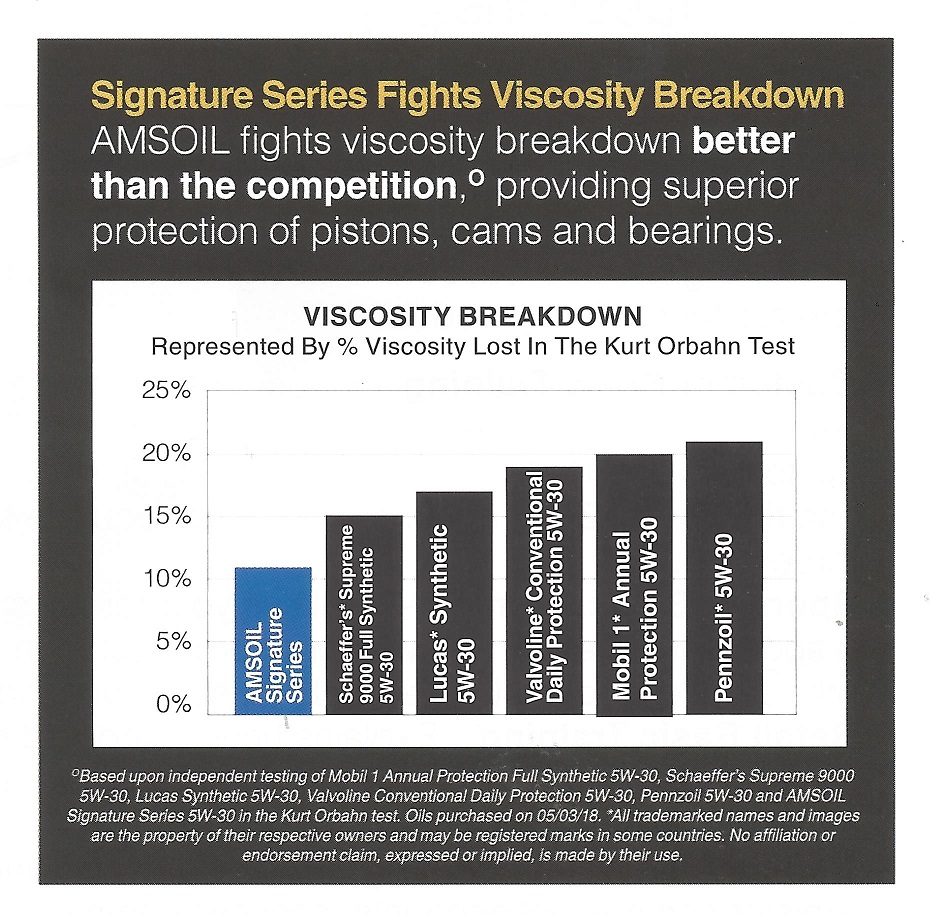Todays Muscle Cars Require Oil That Covers A Wide Viscosity Range
Matt Erickson | VP, PRODUCT DEVELOPMENT
Horsepower has never been more accessible. The 2021 Dodge* Charger* SRT* Hellcat* Redeye* makes a ridiculous 797 horsepower. Ford* and Chevrolet* loyalists have the 760-hp Shelby* GT500* and 650-hp Camaro* to sate their appetites.
Along with all that power comes added engine stress. These engines place incredible pressure on the crankshaft, bearings and other components. As you know, the motor oil’s viscosity plays a crucial role in protecting components from wear. One interesting feature of these powerful muscle-car engines is the oil viscosity they require. Dodge and Chevrolet often specify 0W-40, while Ford requires 5W-50 in certain late-model Mustangs.*
There’s a good reason for designing these engines to use an oil with a higher 40- or 50-weight viscosity. Once the engine reaches operating temperature, the oil has to withstand extreme heat and help prevent metal- to-metal contact despite all the power they make. Higher-viscosity oil stays thicker at operating temperature. This helps form a strong, consistent lubricating film between the crank journals and bearings to ensure the engine lasts as designed and continues to put out all that power you crave.
That sounds easy enough, but it’s difficult to properly formulate an oil that performs like an SAE 5W at startup and an SAE 50 at operating temperature without sacrificing performance. Powerful engines tend to shear the oil, causing it to lose viscosity. Shear, which can be thermal or mechanical in nature, literally tears oil molecules apart. Once this happens, the 40- or 50-weight oil you put in your engine prior to track day can become a 40- or even 30-weight oil after several laps. This inability to maintain sufficient viscosity results in compromised wear protection.
The key to maintaining the performance of these engines is to use a high-quality synthetic oil that retains its viscosity despite intense heat and stress. To achieve such wide viscosity ranges, formulators often use viscosity modifiers, which are polymers that expand as the temperature increases, increasing the oil’s viscosity.
Think of them like springs. At startup, they are contracted and short, which reduces internal fluid friction between molecules. As the oil heats up, the springs stretch and bump into each other, increasing fluid friction and viscosity. This allows the oil to perform like an SAE 5W at startup and an SAE 50 at operating temperature.
Like anything, viscosity modifiers come in a range of qualities, and low-quality viscosity modifiers readily shear. Once they shear, it’s like cutting the springs in half. While they still contract and stretch as designed, they cannot stretch as long as before, reducing the oil’s ability to return to the designed operating viscosity and protect against wear.

The key is to formulate oil using the highest-quality synthetic base oil possible, which reduces reliance on viscosity modifiers. High-quality synthetic base oils, like those we use in AMSOIL Signature Series Synthetic
Motor Oil, naturally flow well at startup because they don’t contain waxes that thicken in the cold. We also use
only the highest-quality additives, which results in more resistance to shear and better viscosity control. Combine that with the highest quality viscosity modifiers, and the result is an exceptionally strong product that resists shear and controls viscosity.
In fact, the proof is shown in the graph. In the industry-standard Kurt Orbahn Test, which measures viscosity loss, Signature Series outperformed the competition for better protection of pistons, cams and bearings.
If you own one or more of today’s advanced muscle cars, upgrade engine protection to AMSOIL to ensure the high-powered engines receive the protection they need.
*All trademarked names and images are the property of their respective owners and may be registered marks in some countries. No affiliation or endorsement claim, express or implied, is made by their use. All products advertised here are developed by AMSOIL for the use in the application shown.
Reproduced With The Permission Of AMSOIL INC. All Rights Reserved.
Here is the link to the AMSOIL Signature Series Data Sheets. Pick whatever oil you think is better, get the data sheet for that oil and compare it to AMSOIL.
Next take a look at the Field Study done with Las Vegas Taxi Cabs.
Now take a look at the Performance Tests done on AMSOIL Signature Series Oils and other AMSOIL Products.
Think it’s a fluke? 25 years ago AMSOIL 0w30 was beating Castrol*, Valvoline*, Quaker State*, Pennzoil* and Havoline* in wear tests, and all of them were heavier viscosities, which should have provided better protection.
Now, contact SLS Associates and find out how easy it is to have AMSOIL Products delivered to your door.
